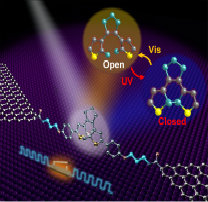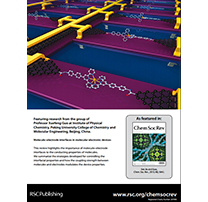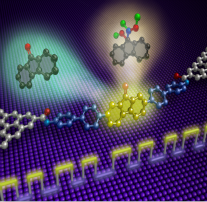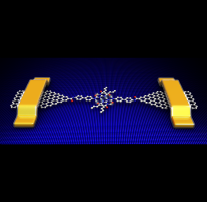Research Fields
 One remarkable aspect in Chemistry is its powerful ability to create new materials; one remarkable aspect in Physics is its powerful ability to investigate the intrinsic properties of these materials, the combination of both enables us to reveal the details of nature and change nature. The research in our molecular materials and devices lab is focused on exploring the optoelectronic properties of novel functional molecular materials and/or low dimensional nanomaterials at the nanometer or molecular level, such as electron transport properties, optoelectronic properties and stimuli-responsive abilities. These materials include single organic molecules/molecular clusters, carbon nanotubes, organic/inorganic nanowires, graphene, biomacromolecules, nanoparticles, and so on. These are challenging and predictable but active and interdisciplinary frontier research areas with many opportunities and great potential applications. Graduate and postdoctoral students working on these projects will have been extensively well-trained in all aspects, including organic syntheses, assembly techniques, micro/nanofabrications, and detection systems. Specifically, our research focuses are listed below:
One remarkable aspect in Chemistry is its powerful ability to create new materials; one remarkable aspect in Physics is its powerful ability to investigate the intrinsic properties of these materials, the combination of both enables us to reveal the details of nature and change nature. The research in our molecular materials and devices lab is focused on exploring the optoelectronic properties of novel functional molecular materials and/or low dimensional nanomaterials at the nanometer or molecular level, such as electron transport properties, optoelectronic properties and stimuli-responsive abilities. These materials include single organic molecules/molecular clusters, carbon nanotubes, organic/inorganic nanowires, graphene, biomacromolecules, nanoparticles, and so on. These are challenging and predictable but active and interdisciplinary frontier research areas with many opportunities and great potential applications. Graduate and postdoctoral students working on these projects will have been extensively well-trained in all aspects, including organic syntheses, assembly techniques, micro/nanofabrications, and detection systems. Specifically, our research focuses are listed below:
1. Nano/molecular electronics;
2. Single-molecule dynamics and detection;
3. Organic/flexible electronics;
4. Chemo/biosensors
News & Events
 One remarkable aspect in Chemistry is its powerful ability to create new materials; one remarkable aspect in Physics is its powerful ability to investigate the intrinsic properties of these materials, the combination of both enables us to reveal the details of nature and change nature. The research in our molecular materials and devices lab is focused on exploring the optoelectronic properties of novel functional molecular materials and/or low dimensional nanomaterials at the nanometer or molecular level, such as electron transport properties, optoelectronic properties and stimuli-responsive abilities. These materials include single organic molecules/molecular clusters, carbon nanotubes, organic/inorganic nanowires, graphene, biomacromolecules, nanoparticles, and so on. These are challenging and predictable but active and interdisciplinary frontier research areas with many opportunities and great potential applications. Graduate and postdoctoral students working on these projects will have been extensively well-trained in all aspects, including organic syntheses, assembly techniques, micro/nanofabrications, and detection systems. Specifically, our research focuses are listed below:
One remarkable aspect in Chemistry is its powerful ability to create new materials; one remarkable aspect in Physics is its powerful ability to investigate the intrinsic properties of these materials, the combination of both enables us to reveal the details of nature and change nature. The research in our molecular materials and devices lab is focused on exploring the optoelectronic properties of novel functional molecular materials and/or low dimensional nanomaterials at the nanometer or molecular level, such as electron transport properties, optoelectronic properties and stimuli-responsive abilities. These materials include single organic molecules/molecular clusters, carbon nanotubes, organic/inorganic nanowires, graphene, biomacromolecules, nanoparticles, and so on. These are challenging and predictable but active and interdisciplinary frontier research areas with many opportunities and great potential applications. Graduate and postdoctoral students working on these projects will have been extensively well-trained in all aspects, including organic syntheses, assembly techniques, micro/nanofabrications, and detection systems. Specifically, our research focuses are listed below:










